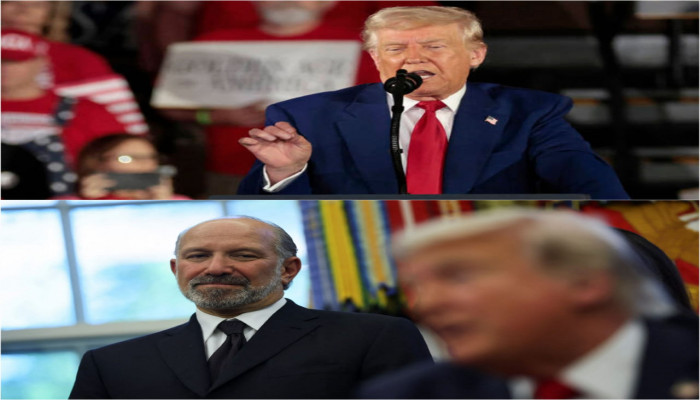Trump moves to ease auto tariffs; Lutnick highlights first successful foreign trade agreement
- In Reports
- 06:10 PM, Apr 30, 2025
- Myind Staff
On Tuesday, U.S. President Donald Trump inked two orders to ease the impact of his auto tariffs, offering a combination of credits and relief from other material levies. His trade team also highlighted their first deal with a foreign trading partner. These moves helped alleviate some investor concerns over Trump's unpredictable trade policies, as he visited Michigan, the heart of the U.S. auto industry, just days before a new set of 25% import taxes on automotive components was set to take effect. The visit, coinciding with his 100th day in office, came at a time when Americans were growing more critical of Trump’s handling of the economy, with signs that his tariffs could hinder economic growth and lead to higher inflation and unemployment.
In a recent change to his tariff policies, the Republican president decided to provide carmakers two more years to increase the proportion of domestic parts in vehicles made in the U.S. This decision will let them to offset tariffs on imported auto parts used in U.S.-assembled cars, equivalent to 3.75% of the vehicle's suggested retail price through April 2026, and 2.5% through April 2027. The auto industry had powerfully lobbied the administration since Trump introduced a 25% tariff on imported vehicles and parts. The tariffs, intended to encourage manufacturers to bring production back to the US, had threatened the integrated automotive supply chain across the U.S, Canada, and Mexico.
Trump said the move would give the industry a “little relief” as companies increase their production in the U.S. “We just wanted to help them … if they can’t get parts, we didn’t want to penalise them.” The White House clarified that this change wouldn’t affect the 25% tariffs imposed last month on the yearly 8 million automobiles the United States imports. Autos Drive America, a group representing Toyota Motor, Volkswagen, Hyundai, and nine other foreign automakers, acknowledged that Trump’s order offered some relief but emphasised that “more must be done to turbocharge the U.S. auto industry.”
Candace Laing, president of the Canadian Chamber of Commerce, stated that the tariff solution did not meet the needs of companies in the closely connected North American industry. “Only an end to tariffs provides real relief. Ongoing ups and downs perpetuate uncertainty, and uncertainty drives away business for both Canada and the U.S,” she stated.
The uncertainty caused by Trump’s tariffs continued to affect the auto industry, as GM withdrew its annual forecast despite reporting strong quarterly sales and profits. In an unusual step, the company also decided to delay its scheduled conference call with analysts until later, waiting to finalise the tariff details. At the same time, U.S. Commerce Secretary Howard Lutnick notified CNBC that he had reached an agreement with one foreign country to ease the "reciprocal" tariffs Trump intends to impose. However, Lutnick did not disclose the country, mentioning that the deal was still subject to local approvals. He noted, “I have a deal done … but I need to wait for their prime minister and their parliament to give their approval.”
While White House officials did not provide additional details about the country in question, Trump remained optimistic about a deal with India, telling reporters: “India is coming along great. I think we’ll have a deal with India.”
Lutnick’s remarks boosted stock prices, which had already been hit hard by Trump’s efforts to reshape international trade and push manufacturers to move production to the U.S. The S&P 500 Index ended the day by 0.6%, marking its sixth consecutive day of gains, the longest winning streak since November.







Comments